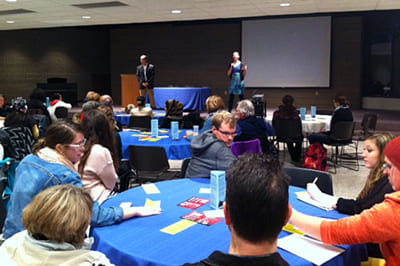 More than 100 people packed the Richard Mauthe Center on the UW-Green Bay campus Thursday (Oct. 30) evening, gathering for a community meal and dialogue designed to combat stereotypes and promote inclusivity.
More than 100 people packed the Richard Mauthe Center on the UW-Green Bay campus Thursday (Oct. 30) evening, gathering for a community meal and dialogue designed to combat stereotypes and promote inclusivity.
“Islam awareness: A conversation about Islam, the Muslim Student Association and inclusivity at UW-Green Bay” was organized in response to a recent well-publicized exchange involving UW-Green Bay alumna Heba Mohammad ’14 and Green Bay Alderman Chris Wery. Mohammad had emailed Wery to inquire about free bus service on Election Day, and he responded by questioning the Muslim Student Association she founded and asking whether she condemns Islamic terrorism. Wery, who was not in attendance Thursday, has since apologized to Mohammad and said he will meet with the association’s faculty advisers. Still, organizers said, the exchange demonstrates the need for greater education around Islam and the MSA.
“This event provided a tremendous opportunity for education and positive dialogue around Islam specifically and the importance of inclusivity generally,” said UW-Green Bay Associate Prof. Heidi Sherman, co-director of the University’s Center for Middle East Studies and Partnerships and co-faculty adviser for the UW-Green Bay MSA.
The evening kicked off with a Somali dinner at 6 p.m., which was followed by the full program at 6:30. Mohammad Rashid, president of the Fox Valley Islamic Society, delivered the evening’s keynote address, speaking from the heart about his faith and its tradition of peace. He read from the Quran and the Hadith (sayings of the Prophet Muhammad), and also offered historical perspective on Islam.
Muslims often are the victims of guilt by association, Rashid said, as people confuse what is fundamentally a peaceful religion with the acts of radicals who claim the faith as a justification for their actions.
“I ask you to look beyond it — what are the facts?” he said. “I would like to have a dialogue with that alderman who made those comments to Heba. I’m, at heart, a citizen of America. I love this country.”
Later in the program, Mohammad and Sherman joined Rashid for a panel discussion in which they accepted oral and written questions from the audience. The trio addressed a variety of queries ranging from the basics — prayer five times a day — to addressing stereotypes and discrimination.
“The religion I know, the religion I practice,” Rashid said, “… My religion tells you even not to offend somebody with my words. It is that careful. … That is the religion of Islam.”
In the age of social media, Mohammad added, it’s easy for people to hide behind negative comments made online.
“If you have a question about any culture,” she said, “I highly recommend you get to know someone (from that background).”
The evening also featured a discussion on inclusivity, and a presentation from Residence Life’s Quin Merriweather and University Police Officer Cristey Johnson on UW-Green Bay’s participation in national Stop the Hate programming.
As the panel discussion wound to a close, Rashid told attendees about the Islamic Society’s ultimately successful efforts, some 30 years ago, to build a mosque in Neenah. The group met with initial opposition, he said, but education and dialogue ultimately prevailed.
“The neighbors who opposed our mosque are good friends now,” Rashid said. “They all became very good friends.”

